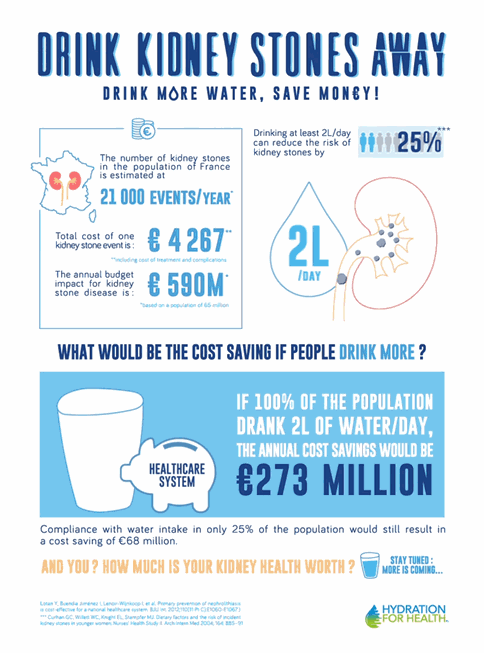The EuHHAC aims to seize the opportunity to promote healthy hydration in the current food ‘climate’; expressed in the Food and Nutrition Action Plan (FNAP) and complemented in the EFAD European Dietetic Action Plan.
A series of actions were undertaken as part of the EuHHAC to increase awareness and knowledge on healthy hydration among dietitians and health professionals. These actions include surveys, webinars, interactive session and tutorials on hydration. In 2019, a paper was published in Annals of Nutrition and Metabolism articulating the progress of the work to date. As part of the EuHHAC, an online Hydration Resource Center (HRC) was also developed, where members of EFAD can access evidence-based resources on healthy hydration and find tools to use in their daily practice.
References
Belogianni K, Gandy J, van Ginkel A, Liddell J, Wagner RY, Lagoudakis L, Douglas P (2019). European Healthy Hydration Awareness Campaign for Dietitians. Ann Nutr Metab. 74; 3:57-65. doi: 10.1159/000500347.
Fluid Classification
What is water, fluids and beverages? Total water intake is the intake of water from fluids and food. Total fluid intake is the intake of drinking water including tap water, bottled water (still or sparkling) and all kinds of beverages. Beverages include the intake of milk and alternatives, hot beverages, juices, regular sweet beverages, diet beverages and alcoholic beverages.
Facts and cost benefits of drinking water
Both diet and fluid intake can play a significant role in the pathogenesis of kidney stones. Evidence from large perspective studies has shown that an increased total fluid intake compared to low intakes was associated with a decreased risk of kidney stone formation (Curhan et al., 2004, Taylor et al., 2004).
The European Association of Urology recommends increasing fluid intake independent of the type of stones to achieve a urine volume of more than 2L /day, in addition to other dietary and lifestyle advice risk factors as shown in the table.
General preventive methods of the European Association of Urology
Fluid intake (drinking advice):
- Fluid amount: 2.5-3.0 L/day
- Circadian drinking
- Neutral pH beverages
- Diuresis: 2.0-2.5 L/day
- Specific weight of urine: <1,010 L/day
Nutritional advice for a balanced diet:
- Rich in vegetables and fibre
- Normal calcium content: 1-1.2 g/day
- Limited NaCl content: 4-5 g/day
- Limited animal protein content: 0.8-1.0 g/kg/day
- Avoid excessive consumption of vitamin supplements
Caution: Protein need is age-group dependent; therefore, protein restriction in childhood should be handled carefully.
Lifestyle advice to normalise general risk factors
- Body mass index (BMI): Retain a normal BMI level
- Adequate physical activity
- Balancing of excessive fluid loss

Drinking water not only prevents the formation of kidney stones but it also has a cost-effectiveness in the healthcare system. Cost-effectiveness is the balance between what it costs to intervene and what would be achieved in terms of better outcomes. According to an analytical model applied by Lotan et al., (2012), if 100% of the French population drink 2L per day of water, this would result in an annual prevention of 9265 kidney stones, with an associated € 273 million cost saving for the national healthcare system.
References:
Curhan GC, Willett WC, Knight EL, Stampfer MJ. Dietary Factors and the Risk of Incident Kidney Stones in Younger Women: Nurses’ Health Study II. Arch Intern Med. 2004;164(8):885–891. doi:10.1001/archinte.164.8.885.
Taylor EN, Stampfer MJ, Curhan GC. Dietary factors and the risk of incident kidney stones in men: new insights after 14 years of follow-up. J Am Soc Nephrol. 2004;15(12):3225-32. doi: 10.1097/01.ASN.0000146012.44570.20. PMID: 15579526.
Lotan Y, Buendia Jimenez I, Lenoir-Wijnkoop I, Daudon M, Molinier L, Tack I, et al. Primary prevention of nephrolithiasis is cost-effective for a national healthcare system. BJU Int. 2012;110(11 Pt C):E1060-7.



